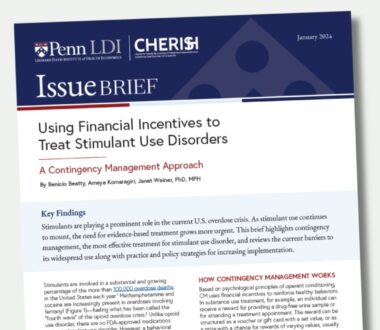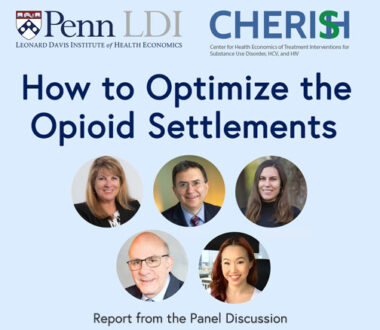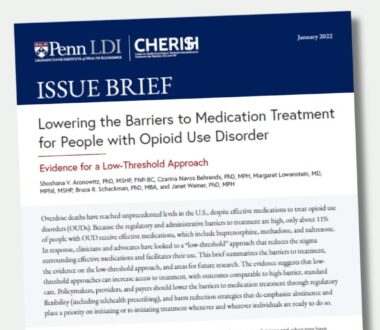
7 Ways to Improve an Already Effective Treatment for Stimulant Use Disorder
The opioid epidemic has been one of the most pressing and challenging issues that the U.S. has faced in recent decades, with countless lives lost to this devastating crisis. Now, stimulant-related overdoses are among the next big drug-related concerns, with recent studies showing that the mortality rate linked to stimulant use in the U.S. has […]

Surgeons Are Closer to Predicting Which Patients Need Post-Surgery Opioids—and Which Ones Don’t
Opioids are routinely prescribed to patients after a surgery—whether they use them or not. A new study, led by LDI Senior Fellow Anish Agarwal will help tailor prescribing so patients get the right amount of opioid medications; not too little and not too much. Unused opioids are a particular problem. Opioid misuse can start when extra tablets […]

Chart of the Day: Rise in Patients with Opioid Use Disorder Leaving Hospital Prematurely
LDI Senior and Associate Fellows Ashish Thakrar, Margaret (Maggie) Lowenstein, Ryan Greysen, and M. Kit Delgado found that more people with opioid use disorder are leaving the hospital prematurely (or before medically advised), compared to marginal increases for individuals admitted for other reasons. In the study, “Trends in Before Medically Advised Discharges for Patients with Opioid Use Disorder, 2016-2020,” […]

Stigma and Sluggish Bureaucracy Block Treatment for Stimulant Use Disorder
So, imagine there’s a runaway epidemic of overdose deaths that involve non-opioid drugs and that we’ve had an evidence-based therapy for this unique addiction for the last forty years—but for reasons largely grounded in legislators’ and the public’s visceral disdain for people who use substances, we have refused to nationally recognize or widely implement this […]

Incentivizing Recovery: Payment, Policy, and Implementation of Contingency Management
On January 19th, 2024, CHERISH and the University of Pennsylvania’s Leonard Davis Institute of Health Economics (LDI), co-hosted a virtual convening titled Incentivizing Recovery: Payment, Policy, and Implementation of Contingency Management. Contingency management is a proven and promising treatment for specific substance use disorders, especially stimulant use disorder. However, significant gaps in knowledge regarding the […]

Using Financial Incentives to Treat Stimulant Use Disorders
Stimulants are involved in a substantial and growing percentage of the more than 100,000 overdose deaths in the United States each year. Methamphetamine and cocaine are increasingly present in overdoses involving fentanyl—fueling what has been called the “fourth wave” of the opioid overdose crisis. Unlike opioid use disorder, there are no FDA-approved medications to treat […]

Many State Medicaid Programs Still Require Prior Authorization for Buprenorphine Treatment for Opioid Use Disorder
The opioid epidemic has been an ongoing public health crisis in the United States, claiming countless lives and devastating communities. Buprenorphine, a highly effective medication for the treatment of opioid use disorders, holds the potential to save lives. However, a significant hurdle exists in the form of prior authorization requirements, which are associated with lower access to […]

LDI Experts Analyze the New U.S. Plan to Target Xylazine-Laced Fentanyl
The lethal mixture of xylazine and fentanyl, also known as Tranq dope, may sound unfamiliar to many, but its impact is harming people who use drugs nationwide. Xylazine, approved by the U.S. Food and Drug Administration for veterinary use as a sedative, has become a major component in the illicit drug trade. When consumed by humans, xylazine causes […]

Will States and Counties Spend Their National Opioid Settlements Effectively?
As $54 billion in National Opioid Settlement funds begin moving out toward states, counties, and municipalities, there is widespread concern among health authorities that the legal victory does not become a repeat of the 1998 mega-billion-dollar Tobacco Master Settlement Agreement fiasco in which most states used the money for just about everything except tobacco cessation […]

Why Does the Opioid Mortality Rate Continue to Rise?
From April 2020 through April 2021, there were 100,300 drug overdose deaths across the country according to the CDC — a 28.5% increase over the previous year. Some 75% of these were opioid-related overdoses that killed an average of nine users an hour around the clock throughout the year. Looking forward, the just-published Stanford-Lancet Commission on […]

Advancing Evidence-Based Substance Use Disorder Treatment Policies
If you want to reform state laws to require detox facilities to include medications like buprenorphine and methadone in their treatments, you should start by changing the “hearts and minds” of those who oppose it, Rebekah Gee, MD, MPH, MHSPR, told the January 14, 2022 Penn LDI/CHERISH Virtual Conference at the University of Pennsylvania. Keynoting a gathering organized […]

Lowering the Barriers to Medication Treatment for People with Opioid Use Disorder
Overdose deaths have reached unprecedented levels in the U.S., despite effective medications to treat opioid use disorders (OUDs). Because the regulatory and administrative barriers to treatment are high, only about 11% of people with OUD receive effective medications, which include buprenorphine, methadone, and naltrexone. In response, clinicians and advocates have looked to a “low-threshold” approach […]
Engage with CHERISH
Submit a Consultation Request or Contact Us to learn more about how CHERISH can support your research or policy goals.